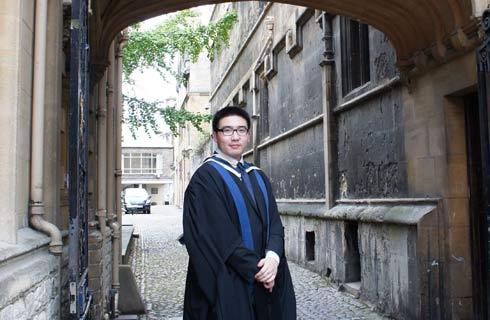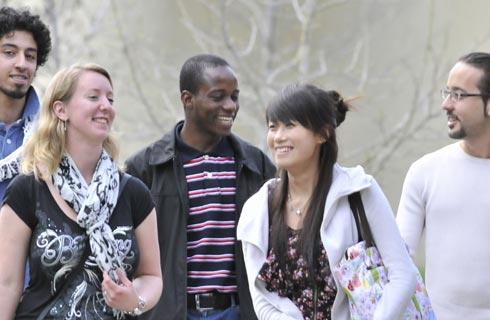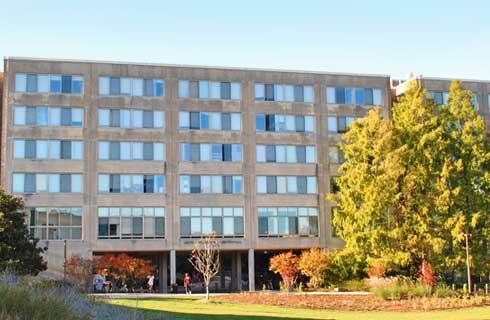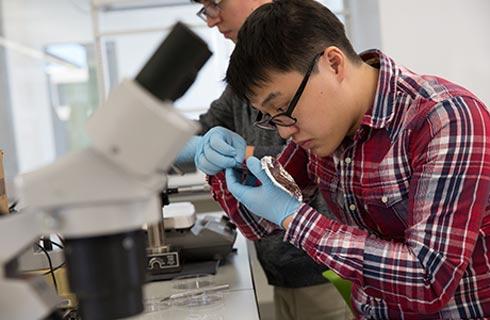理学硕士(荣誉)食品科学
MSci, BSc (Hons) Food Science

学历文凭
Bachelor Degree

专业院系
School of Food Science and Nutrition

开学时间

课程时长

课程学费

国际学生入学条件
IDP—雅思考试联合主办方

雅思考试总分
- 雅思总分:
- 托福网考总分:
- 托福笔试总分:
- 其他语言考试:
CRICOS代码: D611
申请截止日期: 请与IDP联系 以获取详细信息。
课程简介
The food industry is one of the largest in the world — with leading global corporations seeking qualified scientists who have the acumen to advance their products. Whether it’s enhancing the quality and safety of food products that interests you, or you’re keen to develop brand new products from concept to launch, the extensive skill set you’ll build on our Food Science MSc will open the door to many diverse career opportunities in this ever-evolving field. From challenging current issues in food production to applying scientific concepts to grasp the complex characteristics of food, this programme will broaden your understanding of crucial areas in the food industry. Our School of Food Science and Nutrition is home to world-leading research which has impacted key areas in food and directly informs the course, meaning you’ll be learning emerging innovations and issues in food science. This means that, once you graduate, you’ll be fully equipped with the topical knowledge and advanced skills sought after by global companies in industry. Studying an MSc in the School of Food Science and Nutrition at Leeds will also give you access to specialist facilities that’ll prepare you for working in the field and a programme team consisting of academics and researchers who work within the School’s research institutes and groups. Why study at Leeds: This Masters degree is accredited by the Institution of Food Science and Technology. Our globally-renowned research here at Leeds feeds into your course and shapes your learning with the latest thinking in areas such as colloids and diary science (including plant-based dairy), food biochemistry, food safety and regulatory practice and novel food design. Advance your knowledge and skills in critical areas sought after in industry, including food processing, microbiological and chemical food safety and the physical aspects of food. Conduct your own independent research project as part of your course and gain industry experience in investigating an exciting real-world problem, mirroring the type of work you’ll be conducting in your professional career. Access specialist facilities, including industry-grade equipment for investigating the colloidal nature of foods, small and wide-angle X-ray scattering equipment (SAXs & WAXS), electron microscopy facilities, texture analysers, tribometers and HPLC, LCMS and GC analytical equipment and computerised sensory testing. Experience excellent practical and theoretical teaching delivered by a programme team with a wealth of expertise and strong industrial links. Enhance your career prospects and join our successful alumni who have pursued careers in revered global companies including Nestlé, Britvic Soft Drinks and ASDA. Master the most up-to-date practices and techniques recognised in industry on a course that has been directly informed and advised by the Industrial Advisory Board. Join our online taster courseLearn how food scientists and nutritionists combine knowledge from engineering, biology and physical sciences to study all aspects of food and to ensure what we consume is safe and wholesome. Join now on Futurelearn.Integrated MastersLearn more about what an integrated Masters is and how it can benefit your studies and boost your career.View this video on Bilibili.AccreditationInstitute of Food Science and TechnologyAccreditation is the assurance that a university course meets the quality standards established by the profession for which it prepares its students. This course is accredited by the Institute of Food Science and Technology. This accreditation certifies that this integrated Masters programme (MSci, BSc) delivers evidence-based food science education to a professionally recognised level, giving students the opportunity to develop the knowledge and skills necessary to enter into employment in the food industry, research, education and the public sector.
相关申请
 预科
预科 奖学金
奖学金 实习机会
实习机会 在校学习
在校学习 跨境学习
跨境学习 校园授课-线上开始
校园授课-线上开始 在线/远程学习
在线/远程学习
开学时间&学费
学费信息仅供参考,请与IDP联系以获取详细信息
| 开学时间 | 时长 | 学费 | 地点 |
|---|
学校排名

世界排名153
数据源:
泰晤士高等教育世界大学排名
关于利兹大学

利兹大学在《2025 完整大学指南》中名列英国大学前25名,在2025 QS世界大学排名中名列世界前100名。它也是罗素大学集团大学之一,这是英国著名的顶尖研究密集型大学名单。该大学的学生满意度很高,在英国排名第三(2018年《泰晤士报高等教育学生体验调查》)。作为同一项调查的一部分,该大学的校园设施在英国排名第二,这是对学生发挥潜力的绝佳校园的认可。近年来,两栋新建筑投资超过1.2亿英镑。体育设施也被认为是世界级的。The Edge是一个为学生提供的令人难以置信的健身中心,包括一个25米的室内游泳池、攀岩墙和为不同体育活动设置的各种大厅。这是一所热情友好的大学,拥有充满活力、多样化的学生群体。事实上,来自世界130多个不同国家的13800多名国际学生在利兹大学学习。学生会是这个国家最活跃、最活跃的工会之一。学生可以加入300多个俱乐部和社团,利兹大学联盟(LUU)是英国第一个被全国学生联合会评为''优秀''的俱乐部和社团。
本校相关课程

生物多样性与保护
学历文凭
Masters Degree (Taught)
开学日期
课程费用总额


统计博士学位
学历文凭
Ph.D.
开学日期
课程费用总额


纯粹数学博士学位
学历文凭
Ph.D.
开学日期
课程费用总额


应用数学博士学位
学历文凭
Ph.D.
开学日期
课程费用总额


PhD in Geography
学历文凭
Ph.D.
开学日期
课程费用总额


PhD in Microwave and Millimetre Wave Engineering
学历文凭
Ph.D.
开学日期
课程费用总额

其他相关课程

商科学士(国际餐厅管理)(阿德莱德)
 澳大利亚蓝带国际学院
澳大利亚蓝带国际学院学历文凭
Bachelor Degree
开学日期
课程费用总额


Certificate II in Hospitality
 霍姆斯格兰职业技术学院
霍姆斯格兰职业技术学院学历文凭
Certificate II
开学日期
课程费用总额


食品科学与技术研究生证书
 昆士兰大学
昆士兰大学泰晤士高等教育世界大学排名:80
学历文凭
Graduate Certificate
开学日期
课程费用总额


酒店三级证书(餐厅前门)
 查尔斯·达尔文大学
查尔斯·达尔文大学泰晤士高等教育世界大学排名:417
学历文凭
Certificate III
开学日期
课程费用总额


待业证书4(0.5年)
 新南威尔士州立职业技术学院
新南威尔士州立职业技术学院学历文凭
Certificate IV
开学日期
课程费用总额


理学硕士(食品科学与技术)
 科廷大学
科廷大学泰晤士高等教育世界大学排名:256
学历文凭
Masters Degree (Coursework)
开学日期
课程费用总额










 英国
英国